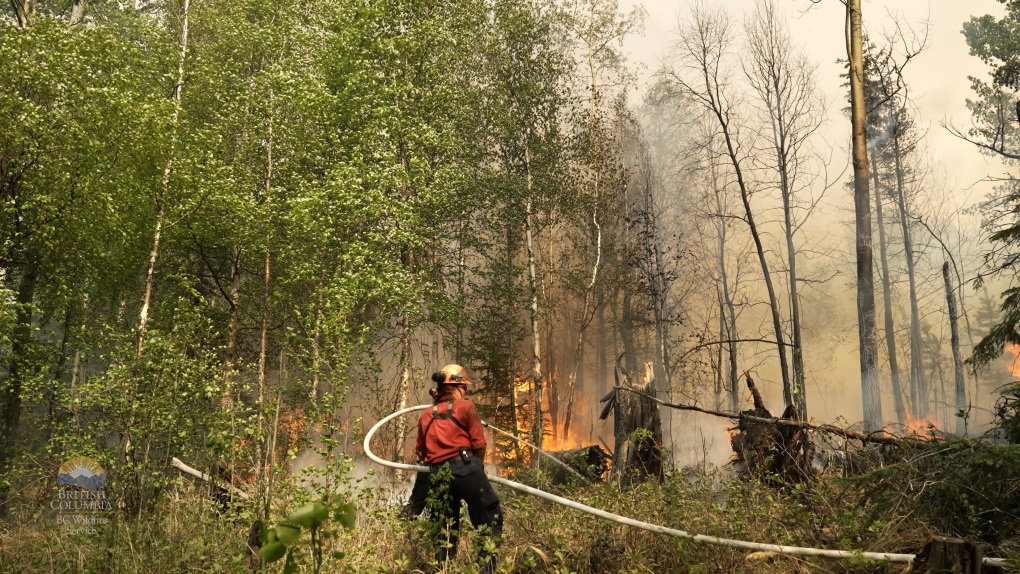B.C. could face another 'very challenging' wildfire season, officials say
 Courtesy: BC Wildfire Service.
Courtesy: BC Wildfire Service.
The B.C. government is bracing for an early start to the 2024 wildfire season, with El Niño conditions expected to bring a warmer and drier spring than usual.
Crews responded to two new wildfires in the Okanagan over the weekend, and there are many other "holdover fires" from last season that have continued since the fall.
On Monday, with days left in winter, the Ministry of Emergency Management and Climate Readiness urged British Columbians to begin preparing evacuation plans for a worst-case scenario.
"We all have busy lives but nothing is more important than you and your family's safety," Minister Bowinn Ma said at a news conference.
"I realize that this is earlier than you might typically do this, but that's because this upcoming season has the potential to be a tough one."
Ma encouraged families to make time over the coming weeks to prepare a grab-and-go kit, and to review what they would do in the event of an evacuation – including which friends or relatives they might be able to stay with during an emergency.
"Ensure you have insurance and review your home insurance policy to understand how to access coverage if you are evacuated and in need of accommodation," the minister added.
El Niño conditions are expected to fade during the spring, but could still contribute to below-average rainfall and above-average temperatures over the coming months, according to the province.
The forecast follows a months-long "precipitation deficit" recorded across most of B.C., which left the average provincial snowpack at 66 per cent of normal, as of a March 1 bulletin.
"The climate crisis is here and we are feeling the impacts of climate change. It is no secret that we did not accumulate the snowpack that we were hoping for in many parts of the province," Ma said.
"And while we all hope to get more rain in the months ahead, we are taking action now to prepare for what could be a very challenging season."
Officials noted the lack of snowpack brings a decreased flood risk in some communities, but cautioned there is also the potential for prolonged drought, as many areas experienced last summer.
In a statement, Nathan Cullen, the province's minister of water, land and resource stewardship, said the government has been taking steps to avoid the worst consequences of extended drought conditions.
"We have boosted community emergency grants, water infrastructure and supports for farmers and ranchers, and we will keep finding ways to support people, communities, businesses and wildlife in the face of drought," Cullen said.
Last year's wildfire season was the most destructive on record, burning more than 2.84-million hectares of land, along with hundreds of homes and other structures.
The fires also prompted evacuations that temporarily displaced tens of thousands of residents.
To prepare for this year, Premier David Eby ordered an Expert Task Force on Emergencies in October, and Ma said the team has been delivering recommendations in "real time" so they can be implemented before the 2024 season is underway.
Earlier on Monday, officials confirmed B.C. will be expanding the use of "enhanced technology" for predicting wildfire behaviour after testing it out in two regions in 2023.
The software uses weather models, topographical data and fuel maps along with real-time information from the field to forecast wildfire growth and movement.
The province is testing additional tools to bolster firefighting efforts, including "drones for aerial ignitions, infrared scanning for hazard assessments, and 5G technology for more sensor networks to monitor forest conditions," according to the Ministry of Forests.
CTVNews.ca Top Stories

BREAKING Ontario Premier Doug Ford threatens to cut off energy to U.S. in response to Trump's tariffs
Ontario Premier Doug Ford has threatened to cut off energy supply to the U.S. in response to the tariffs President-elect Donald Trump plans to impose on all Canadian imports.
Elon Musk calls Justin Trudeau 'insufferable tool' in new social media post
Billionaire Elon Musk is calling Prime Minister Justin Trudeau 'an insufferable tool' in a new social media post on Wednesday. 'Won't be in power for much longer,' Musk also wrote about the prime minister on 'X.'
Trudeau will have to 'kiss the ring' to achieve smoother bilateral relations with Trump: John Bolton
If Prime Minister Justin Trudeau wants to get on U.S. president-elect Donald Trump's good side for the sake of a smooth bilateral relationship, he'll likely have to be openly deferential, says former U.S. National Security Advisor, John Bolton.
MAID cases rose to 15,000 in 2023, but growth of cases halved
More than 15,000 people received medical assistance in dying in Canada in 2023, but federal statistics show the growth in cases has slowed significantly.
Luxury real estate brokers charged in federal indictment with sex trafficking in NYC
Two luxury real estate brokers and their brother have been charged with luring, drugging and violently raping dozens of women over more than a decade.
Police locate labyrinth of tunnels connecting tents to generator in Hamilton encampment
Hamilton police say that they discovered a series of 'man-made holes and tunnels' during a patrol of a downtown encampment earlier this week.
Certain foods may disrupt your body's fight against cancer cells, study says
The food you eat may be affecting your body’s ability to fight cancer cells in the colon, according to a new study.
Banks lower prime rates following Bank of Canada move
Canadian financial institutions are lowering their prime lending rates to match the decrease announced by the Bank of Canada.
Toronto agency launches court challenge against new law that would shutter some supervised consumption sites
A social agency that runs a supervised consumption service (SCS) in Toronto’s Kensington Market has launched a court challenge against new legislation that will see 10 such sites shuttered across the province, arguing that the law violates the Charter of Rights and Freedoms.

































